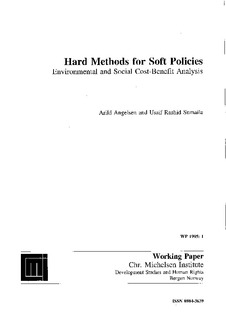| dc.description.abstract | The quest for sustainability has put the conventional Cost-Benefit Analysis (CBA) technique under fierce attack. Much of the critique is, however, misplaced or based on misunderstandings. Alternative methodologies for project appraisal are often insufficient for making the unavoidable hard choices on resource use and distribution. The paper further argues that it is impossible to formulate any unified and operational definition of sustainability applicable to project appraisal. As an alternative strategy, two basic concerns in the sustainability debate, environmental and distributional, are identified. The paper explores how these can be integrated into the consistent framework which CBA provides. This expansion of the conventional analysis, which is labelled Environmental and Social CBA (ESCBA), particularly focuses on environmental valuation, distributional weights, and discounting. | |
